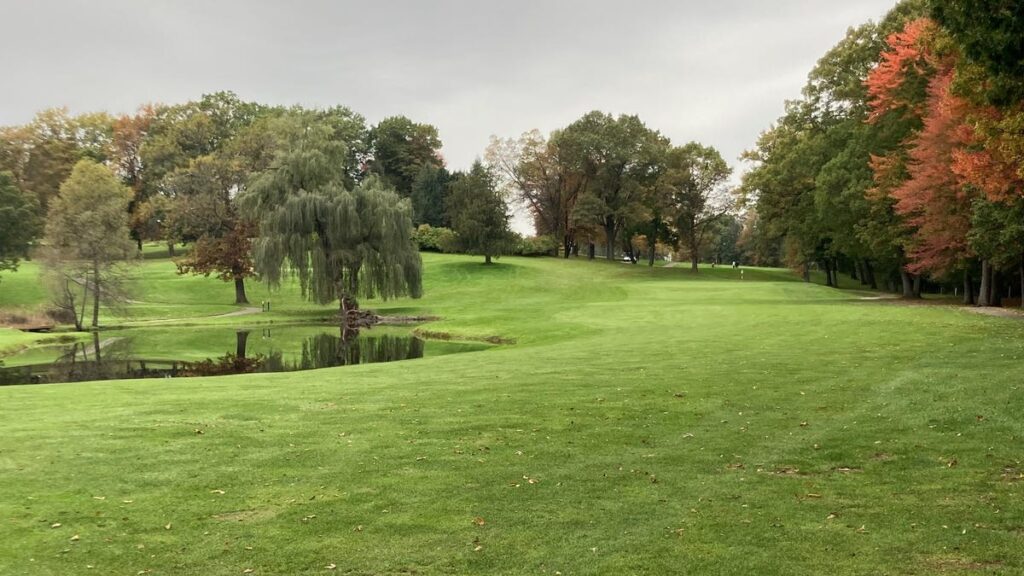The new routing for the future Proving Ground Golf Club, at the current Dunham Hills in Hartland, was revealed by architect Mike DeVries, who designed Greywalls and Kingsley Club.
Golf fans in metro Detroit, get excited: A world-class name in golf course architecture is bringing his talents to southeast Michigan.
Mike DeVries, based in Traverse City and best known in these parts for crafting Kingsley Club and Greywalls at Marquette Golf Club, is the designer tabbed for a project at Dunham Hills in Hartland, 10 minutes from the intersection of M-59 and U.S. 23.
The redesigned course, if all the money is raised, will be rebranded as Proving Ground Golf Club, a nod to Detroit’s historic automotive industry. (The new logo is a sports car with a flag in the back seat.) It could open by 2027, according to Crain’s.
The property was purchased in December 2024 by a group of investors who are “passionate, like-minded golfers,” including Michigan Golf Hall of Famer Brian Cairns. DeVries’ new routing was revealed May 31 after more than a year of planning.
Proving Ground wants to offer something different, something rarely seen in golf clubs in America. The club will offer public play, but its grand vision will be modeled after clubs in the United Kingdom, where a robust annual season pass membership base takes a block of play in part to lower fees and hopefully take better care of the golf course. There will still be plenty of tee times available for the public. It’s a setup used by the acclaimed Belvedere in Charlevoix.
“The plan was simple, start with great land and a top-tier architect,” the club said in a statement. “With Dunham Hills and Mike DeVries we found both.
“From scouting and acquiring the property, walking the land with Mike, and watching his sketches evolve into a world-class design, this journey has been nothing short of extraordinary. Mike’s vision is now taking shape, and we couldn’t be more excited about what’s ahead.”
Dunham Hills is a tree-lined routing with up-and-back holes, allowing shorter walks between greens and tees, with plenty of movement in the land — a nod to its name. DeVries’ style is to let the natural property determine the golf, and he has a good canvas to work with at the par-71, 6,758-yard course built in 1967.
DeVries’ reimagined layout and routing is set at 6,859 yards from the tips playing as a par-70 layout. It has two par-5s and three par-3s on the front nine, including a short 137-yard sixth hole, and takes out the back-to-back par-5s on Nos. 12-13 and instead has a par-5 14th.
“Really, when you start to look at a piece of property, I respond to what’s inherently there,” he recently told Michigan Golf Journal. “Asking, how do we build good, fun golf that’s engaging for every level of player for that property, and not just try to drop a template in there, or this idea or that idea, and try to reproduce it.
“For me, it’s sculpture with a 20,000-pound piece of equipment. To me, that’s all part of the creative process and figuring out the right puzzle and how we solve that.”
DeVries, now known worldwide for his course designs, has three other Michigan layouts to his name besides Kingsley (2001) and Greywalls (2005), each in west Michigan and well-regarded by golfers: Pilgrim’s Run (Pierson), Diamond Springs (Hamilton) and the Mines (just outside Grand Rapids).
Marlowe Alter is an assistant sports editor at the Detroit Free Press and spraying golf aficionado. You can reach him by email: malter@freepress.com.
Follow the Detroit Free Press on Instagram (@detroitfreepress), TikTok (@detroitfreepress), YouTube (@DetroitFreePress), X (@freep), and LinkedIn, and like us on Facebook (@detroitfreepress).
Stay connected and stay informed. Become a Detroit Free Press subscriber.
Read the full article here


